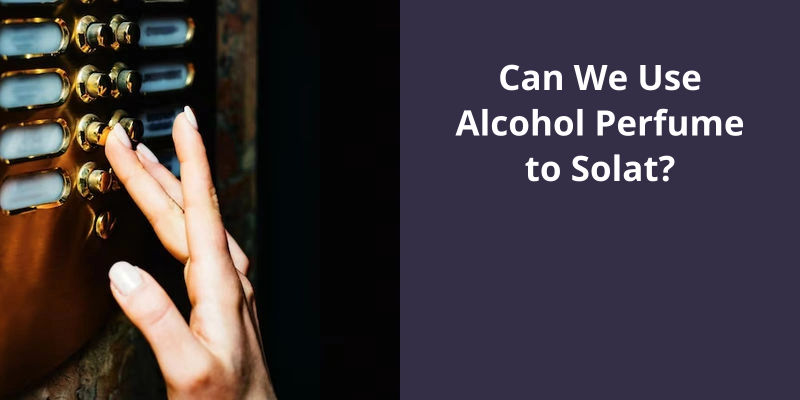The use of alcohol-based perfume in Solat, which is a Muslim prayer, can depend on differing interpretations of Islamic law. Some scholars believe it is acceptable because the alcohol in perfume is not the same as the one that is prohibited for consumption in Islam. On the other hand, some argue that anything containing alcohol should be avoided, including perfume. Therefore, it’s essential to follow one’s personal understanding, belief, or local religious authority. It’s also worth noting that there are many alcohol-free perfumes available as alternatives for those who prefer to avoid any potentially doubtful substances while preparing for Solat.

Can I Wear Alcohol Perfume and Pray?
Tahir] unless there’s clear evidence indicating otherwise. There’s no explicit evidence in the Quran or Sunnah prohibiting the use of alcohol-based perfumes during prayer. Therefore, one can assume that they’re permissible to use while performing Salah.
2- The primary concern regarding alcohol in Islam is it’s consumption, not it’s external use. In the Quran, alcohol is clearly prohibited for drinking, but there’s no prohibition against using it topically. This distinction suggests that wearing perfumes containing alcohol shouldn’t invalidate ones prayer.
3- It’s worth mentioning that alcohol evaporates quickly when applied to the skin. By the time one begins their prayer, it’s likely that the alcohol in the perfume has already evaporated, leaving behind only the fragrance.
4- In cases where one is unsure about the alcohol content in a perfume, it’s always recommended to dilute it with non-alcoholic substances. By diluting the perfume, any potential doubts or concerns can be alleviated, allowing one to pray with peace of mind.
5- It should be noted that individual scholars may have varying opinions on this matter. Some may argue that wearing alcohol-based perfumes should be avoided as a precautionary measure to stay away from anything that may be questionable. However, this is a matter of personal choice and conscience.
As long as the perfume is used externally and not consumed, it’s permissible to wear during Salah. However, it’s always advisable to exercise caution and consider the opinions of reputable scholars to ensure that one is following the teachings of Islam to the best of their abilities.
The Significance of Perfume in Islamic Culture and It’s Use in Religious Practices.
- Perfume holds great significance in Islamic culture.
- It’s considered a form of personal hygiene and cleanliness.
- Perfume is often used before attending religious gatherings or events.
- It’s believed to enhance spirituality and create a pleasant atmosphere.
- Perfume is also associated with special occasions such as weddings and Eid celebrations.
- In Islamic traditions, the Prophet Muhammad is reported to have worn perfume frequently.
- Perfume is mentioned in various religious texts, emphasizing it’s importance.
- Many Muslims use natural fragrances like oud, rose, or musk.
- Perfume is also used during the ritualistic cleansing called ablution (wudu).
- Wearing perfume is considered a sunnah (recommended practice) for both men and women.
However, it’s important to note that the alcohol content in perfume is significantly lower than that of alcoholic beverages. While perfume may contain a small amount of alcohol, it isn’t intended for consumption and is primarily used for it’s aromatic qualities.
Does Perfume Count as Alcohol?
Perfumes, colognes, and other fragrance products are known for their intoxicating scents that entice our senses. However, they often raise concerns for individuals who adhere to religious practices that prohibit the consumption or use of alcohol. This leads to the question, does perfume count as alcohol?
The answer lies in the composition of these fragrance products. Most fragrance products contain some type of alcohol, usually ethanol – the same type of alcohol found in alcoholic beverages. This alcohol serves a crucial purpose in the product.
Religious interpretations on the use of alcohol in perfume during religious practices vary. Some religious scholars argue that the prohibition on alcohol consumption mainly applies to drinking and intoxication, rather than external application or use. In this regard, applying an alcohol-based perfume wouldn’t invalidate a persons religious practice.
Alternatives to Alcohol-Based Fragrances
- Non-alcoholic perfumes
- Oil-based fragrances
- Solid perfumes
- Natural essential oil blends
- Water-based colognes
- Aromatherapy scents
- Herbal fragrance alternatives
- Ambient scent diffusers
- Scented candles
- Fragrance-free options
Additionally, following the Sunnah of the Prophet not only brings spiritual benefits but also allows one to strengthen their connection with Allah. By incorporating the use of perfume into their daily routine, Muslims can’t only enhance their physical appearance but also elevate their overall character and demeanor. It’s through such small acts of obedience that believers can strive for both worldly contentment and eternal bliss.
Is It Sunnah to Put on Perfume?
Is it Sunnah to put on perfume? The study revealed that the Prophet (peace be upon him) encourages the use of perfume, and by adhering to this Sunnah (prophetic tradition), a Muslim can achieve good here and hereafter, and become more pleasant. It’s said that the Prophet himself used to apply perfume on his body and clothes, and he’d also apply it before attending important gatherings or events. By following this practice, Muslims aren’t only emulating the Prophet, but they’re also embracing a way to enhance their personal hygiene and overall well-being.
Furthermore, the use of perfume can have a positive impact on a persons mental state and overall mood. Research has shown that pleasant fragrances can uplift a persons spirit and improve their emotional well-being.
Moreover, the act of applying perfume before engaging in acts of worship, such as Salah (prayer), can help create a sense of reverence and devotion. When a person smells pleasant, it can contribute to a more focused and mindful prayer experience. By using alcohol-free perfumes, Muslims can ensure that their worship is free from any impurities, as alcohol is considered haram (forbidden) in Islam.
It’s important to note, however, that the use of alcohol-based perfumes may be controversial among some scholars. While some argue that the small amount of alcohol in perfumes is negligible and doesn’t invalidate prayer, others believe that it’s best to avoid any potential impurities and opt for alcohol-free alternatives. Ultimately, it’s up to the individual to consult with their trusted scholars and make informed decisions based on their personal beliefs and interpretations.
The Significance of Personal Hygiene in Islam and the Role of Perfume
In Islam, personal hygiene holds great significance. Muslims are encouraged to maintain cleanliness and purity as it’s seen as a way to enhance spirituality and show respect towards their Creator. Perfume plays a significant role in Islamic traditions, as it’s believed to be a means of adornment and a reflection of good manners.
However, when it comes to performing the ritual prayer, known as Salah or Solat, there are specific guidelines that Muslims are expected to follow. It’s important to note that wearing alcohol-based perfumes or colognes while performing Salah is generally discouraged due to the presence of impure substances in alcohol.
While it’s permissible to use perfumes that don’t contain alcohol, many Muslim scholars recommend avoiding strong fragrances during prayer to prevent distraction and maintain a focused state of mind. Ultimately, it’s essential for individuals to seek guidance from knowledgeable religious authorities and adhere to the teachings and practices of their specific Islamic school of thought.
Conclusion
However, it’s important to note that there’s no clear consensus on the matter. On the other hand, others argue that the impurity of alcohol is metaphorical, meaning that it doesn’t affect the purity of the body or clothes and thus doesn’t invalidate the prayer. Ultimately, it’s up to individuals to seek knowledge, consult with knowledgeable scholars, and make their own informed decisions based on their understanding of Islamic teachings.





